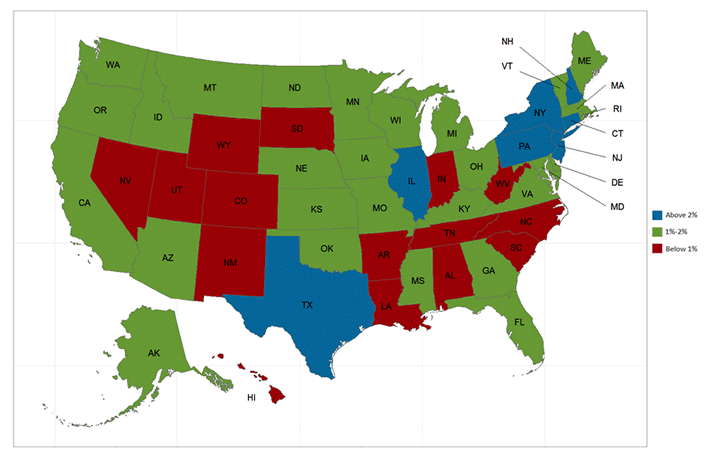Housing
Property Taxes Highest in Illinois, Lowest in Hawaii

Published:
Last Updated:

Illinois claims the highest property tax rate among the 50 states and the District of Columbia at 2.67%, which works out to $2,670 for every $100,000 in value. Hawaiians pay the lowest property taxes, just 0.31%, or just $310 per $100,000 in valuation. The national median property tax rate is 1.31%, or $1,310 per $100,000 in valuation.
Trailing Illinois at the top of the list are New York (2.53%), New Hampshire (2.4%), New Jersey (2.37%) and Texas (2.17%). At the low end of the rankings, South Dakota (0.38%), Alabama (0.54%), Wyoming (0.65%) and Colorado (0.66%) trail Hawaii.
Of the states and D.C., 16 (31%) have a median property tax rate below 1%, while 28 (55%) have a rate between 1% and 2% and seven (14%) have a rate above 2%.
The data were reported Wednesday by CoreLogic, which noted that property tax rates not only differ in amounts from state to state, but also in how many agencies get a piece of the pie. The researchers calculated the median overall property tax rate at the national and state level, taking into consideration all taxing and collection entities. The result provides a complete picture of the cost of owning real property.
CoreLogic also noted:
The analysis shows that higher median tax rates are seen primarily among states in the northeast, with Texas a notable exception at 2.17 percent, where there are multiple levels of tax collection. Conversely, the majority of states with low median tax rates have only a single level of tax collection at the county level. Other than Hawaii, the lowest median property tax rates are primarily in the Rocky Mountain region—in states like Nevada, Utah, Colorado, New Mexico and South Dakota—as well as in southeastern states.
In the following map, states shown in green have property taxes between 1% and 2%. States in blue have property taxes greater than 2%, and states in red have property taxes less than 1%.

A financial advisor can help you understand the advantages and disadvantages of investment properties. Finding a qualified financial advisor doesn’t have to be hard. SmartAsset’s free tool matches you with up to three financial advisors who serve your area, and you can interview your advisor matches at no cost to decide which one is right for you. If you’re ready to find an advisor who can help you achieve your financial goals, get started now.
Investing in real estate can diversify your portfolio. But expanding your horizons may add additional costs. If you’re an investor looking to minimize expenses, consider checking out online brokerages. They often offer low investment fees, helping you maximize your profit.
Thank you for reading! Have some feedback for us?
Contact the 24/7 Wall St. editorial team.